|
|
|
Sort Order |
|
|
|
Items / Page
|
|
|
|
|
|
|
| Srl | Item |
| 1 |
ID:
189457
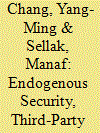

|
|
|
|
|
| Summary/Abstract |
This paper examines third-party trade and its implications for conflicts between hostile countries not engaging in trade. We present a conflict-theoretic model to analyze two adversaries’ endogenous arming decisions when they separately establish a free trade agreement (FTA) with a neutral third-party state. We contrast this multiple FTAs regime with a single FTA regime between one adversary and the third-party state, which excludes the other adversary as a non-member. In our analysis, the benchmark case is a protectionist regime when the bilateral trade between the third-party state and each of the adversaries is a tariff war. Among the three trade regimes, we show that the two adversaries’ aggregate arming is the lowest under multiple FTAs but is the highest under a single FTA. These results suggest that, despite no trade between two adversary countries, multiple FTAs through third-party trade have the pacifying or appeasing effect of lowering overall military buildups in interstate conflicts.
|
|
|
|
|
|
|
|
|
|
|
|
|
|
|
|
| 2 |
ID:
079649
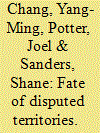

|
|
|
|
|
| Publication |
2007.
|
| Summary/Abstract |
This paper presents a simple model to characterize the outcome of a land dispute between two rival parties using a Stackelberg game. Unlike Gershenson and Grossman (2000), we assume that the opposing parties have access to different technologies for challenging and defending in conflict. We derive the conditions under which territorial conflict between the two parties is less likely to persist indefinitely. Allowing for an exogenous destruction term as in Garfinkel and Skaperdas (2000), we show that, when the nature of conflict becomes more destructive, the likelihood of a peaceful outcome, in which the territory's initial possessor deters the challenging party, increases if the initial possessor holds more intrinsic value for the disputed land. Following Siqueira (2003), our model has policy implications for peace through third-party intervention
|
|
|
|
|
|
|
|
|
|
|
|
|
|
|
|
| 3 |
ID:
089496
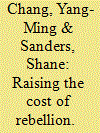

|
|
|
|
|
| Publication |
2009.
|
| Summary/Abstract |
This paper presents a simple model to characterize explicitly the role that an intervening third party plays in raising the cost of rebellion in an intrastate conflict. Extending the Gershenson-Grossman (2000) framework of conflict in a two-stage game to the case involving outside intervention in a three-stage game as in Chang et al. (2007b), we examine the conditions under which an outside party optimally intervenes such that (i) the strength of the rebel group is diminished or (ii) the rebellion is deterred altogether. We also find conditions in which a third party optimally intervenes but at a level insufficient to deter rebellion. Such behavior, which improves the incumbent government's potential to succeed in conflict, is overlooked in some conflict studies evaluating the effectiveness of intervention. One policy implication of the model is that an increase in the strength of inter-governmental trade partnerships increases the likelihood that third-party intervention deters rebellion.
|
|
|
|
|
|
|
|
|
|
|
|
|
|
|
|
| 4 |
ID:
157828
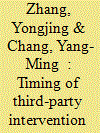

|
|
|
|
|
| Summary/Abstract |
This paper analyzes how the equilibrium outcome of social conflict between factions is strategically altered by third-party intervention. We consider an intervening third party that commits financial support to one of two contending factions for reducing its cost in conflict. Within the framework of three-player sequential-move games, we investigate the questions as follows. What is the optimal intervention intensity in terms of the third party’s financial support? Is there a first-mover advantage in conflict when there is third-party intervention? Fighting against all odds, will the unsupported faction have a chance to prevail when its opponent receives third-party support? What is the optimal timing of third-party intervention? The analysis in the paper has implications for the conditions under which the strategic intervention of a third party may or may not break a conflict between factions.
|
|
|
|
|
|
|
|
|
|
|
|
|
|
|
|
| 5 |
ID:
117689
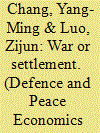

|
|
|
|
|
| Publication |
2013.
|
| Summary/Abstract |
This paper presents an economic analysis of the optimal choice between war and settlement when armed conflicts involve weapon costs and endogenously increasing destruction to consumable resources. In contrast to some earlier findings in the conflict literature, we derive conditions under which war dominates settlement as the Nash equilibrium choice in a one-period game without incomplete information or misconceptions. These conditions are shown to depend not only on resources allocated to the production of military weapons, but also on the endogenous destructiveness of weapons used in warfare. We show that contending parties always allocate more resources to arms productions under settlement (in the shadow of conflict) than under war. When total destruction is less than the difference in arms productions between settlement and war, each party's expected payoff is relatively higher under war. As a result, war dominates settlement. But, when total destruction is greater than the difference in arms productions between settlement and war, each party's expected payoff is relatively higher under settlement. In this case, settlement dominates war and the larger scale of destructiveness associated with higher arms levels generates an effective deterrence for 'armed peace'. One implication of the positive analysis is that, under the threat of conflict, arms reductions for promoting peace can never be voluntary.
|
|
|
|
|
|
|
|
|
|
|
|
|
|
|
|
|
|
|
|
|